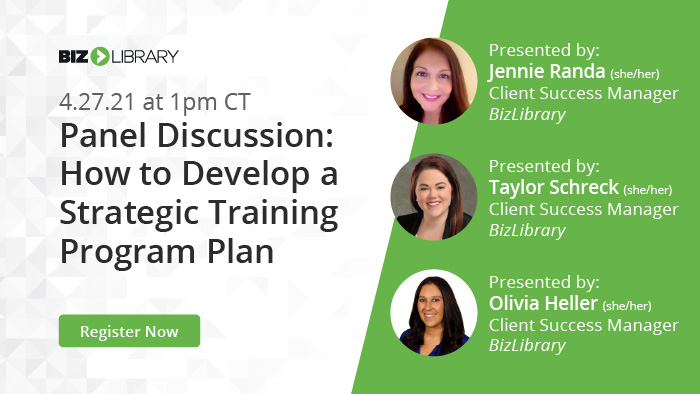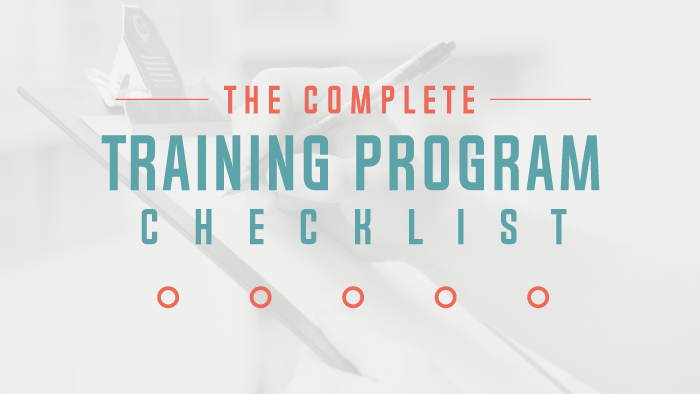Our panel discussion on strategic training program planning was a hit! Our Client Success Managers answered many of your questions regarding where to begin, how to gain leadership buy-in, and how to measure success.
If you haven’t had a chance to view the webinar yet, be sure to check out the on-demand recording.
If you’ve already viewed the webinar but didn’t get to write down all of the tips and tricks, keep reading!
How to Develop a Strategic Training Program Plan with BizLibrary Client Success
Before we jump into the recap of our panel discussion
webinar, for those of you who didn’t have time to join the live webinar, or who
aren’t familiar with the presenters, they deserve an introduction!
Our panel presenters were three of our tenured Client Success Managers, Taylor
Schreck, Olivia Heller, and Jennie Randa. BizLibrary’s Client Success team is
composed of training industry experts who are focused on providing partnership,
support, and resources to help BizLibrary’s clients along every step of the
way. They are true experts on strategic planning because they have seen and strategized
with a variety of their clients in different industries, working with a variety
of objectives.
If you’re looking to develop a strategic training program plan, here are five tips from our team of expert advisors!
Q: What are some tips on developing a strategic plan during a time when our environment is continually evolving?
Agility and adaptability are two competencies all training and development professionals should focus on building and improving in themselves, their people, and their programs.
While it’s important to create a training schedule or calendar to stay organized, remember that external factors could flip the script at any given moment. This year many organizations have transitioned their instructor-led training to online programs, due to the sudden remote workforce and change of pace in the world.
Be sure to continue to communicate changes and updates often, and don’t forget to continue marketing your training program. Just because times are changing, doesn’t mean training needs to stop. In fact, this is the perfect time to ramp up!
Next, don’t lose sight of your focus. Put and keep your people first.
Remember that your employees are going through an emotional journey adapting to change in their personal lives and the work setting. If your employees are feeling overwhelmed, you can use your training program as a tool. Courses that cover mindfulness in the workplace, mental health, anxiety, stress, and agility, are great resources to remind your employees that you and your organization care about them as people, first.
Q: How do you create individual plans for multiple employees?
First and foremost, ask for help! This is no small task. Consult with department managers to identify skill gaps and important competencies before developing a program.
Gather survey feedback from your learners to understand their level of knowledge on a key competency. If you’re stuck on the type of questions to ask, consult with your BizLibrary Client Success Manager. This is where the partnership with BizLibrary and clients plays a pivotal role. The Client Success team is here to offer tactical and strategic guidance.
Once you have the curriculum built out, think about ways to maximize you and your learners’ time. Utilizing playlists or Learning Initiatives in the BizLibrary LMS are very popular time-saving strategies used among our successful clients. This is a great way to build individual plans, track course completions, and view reports to keep the pulse on program success.
Think about your training audience. If the individual you created a plan for doesn’t sit in front of a computer all day, help them by blocking out 30 minutes first thing in the morning or the end of the day so they can stay on track.
Q: What approach is recommended in rolling out the plan?
One approach isn’t better than the other, it’s how you structure it. According to our Client Success panel, there’s a few key items to remember:
- Align your training program to your organizational goals and/or challenges
- Encourage elective training
- Continuously market your training program even after the initial launch
- Gain and maintain leadership buy-in
Q: How can I gain leadership buy-in?
Approach planning leads into one of the most popular topics, how to gain leadership buy-in?
Build a case to present to your leadership by bringing it back to the numbers, cost savings numbers to be specific.
For example, if your current training program is all instructor-led and classroom-style training, itemize the cost for all moving parts in the process. It adds up fast, doesn’t it? And don’t forget about travel expenses!
Now that you have your numbers, create the scenario with online training. Again, this is a great time to loop in your Client Success Managers to help hash out the numbers, and once you have your comparison, share it with leadership.
It’s important to be able to articulate the outcome you are working towards with your program. Starting with the end goal in mind is not only helpful for you regarding designing a program, but leadership will benefit from understanding the overall impact the initiative is expected to create.
Q: What metrics do you recommend using to measure ROI?
Metrics can vary by industry and program focus area, but here are a few common metrics BizLibrary clients use to measure training program ROI:
- Employee turnover
- Internal promotions
- Decreased accidents or injuries
- Improved customer satisfaction and retention
- Sales metrics
No matter the metrics you are choosing, be sure to identify your baseline where your organization stands today. It’s much easier to keep track of progress as you move forward rather than trying to fill in the numbers once the program is rolling.


